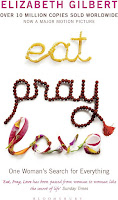 |
| (Amazon UK link) |
A week or so ago, I started reading. I had somehow assumed it was a novel - I evidently didn’t notice the bit on the back saying it was a memoir - but after a few pages I realised there was far too much detail and rambling for it to be fiction. And the first person American protagonist is known as ‘Liz’ - clearly, the author herself.
It starts out as if it were fiction, however, with a dramatic opening. The narrator says she wishes her companion, a younger Italian man called Giovanni, would kiss her. But then she explains why this would be a bad idea. We learn that she’s travelling for a year, during which she has decided to be celebate. Liz has been through an unpleasant divorce and a painful break-up from a subsequent boyfriend, and is now trying to forget them both and to find some kind of peace.
Her plan is to spend four months in Italy, then four months in India, then four months in Indonesia. Three entirely different countries, and her reasons for each are a bit confused. But Liz is a published writer, and she’s been given an advance in order to get a book out of her travels. Which, of course she does, in the form of ‘Eat, Pray, Love’.
The book is divided into three sections, one for each country, each containing 36 short chapters outlining events or conversations that take place while she’s there. The book’s title only becomes clear towards the end: in Italy she eats a lot (mostly pasta and pizza); in India she spends most of her time in an ‘Ashram’ (a Hindu monastic community), praying and meditating, and in Indonesia she falls in love.
Which is really the entire story. Liz is full of grief, anger and confusion as she embarks on her travels, hoping to find consolation and to become closer to God. But she’s somewhat cynical and has no idea if she will achieve her aim. She’s an outgoing, sociable kind of person who has no qualms about visiting new places, or attempting to speak in another language. She’s quite confident she’ll make friends wherever she goes, and she doesn’t seem to have any worries about money despite having lost everything in her divorce.
The entire scheme sounded crazy to me; but then I’m not a fan of travelling, I find it very hard to make friends, and I have no confidence at all about talking to strangers. Nor do I have such casual attitudes to personal morality. I didn’t really relate to Liz at all… and yet found her story quite engaging. She writes in a chatty way that I quite appreciated at first. Having spent a brief time in Italy years ago, I could envisage and appreciate a lot of what she wrote about. Particularly the amazing pizza in Naples.
However, I found the book began to drag somewhat in the India section. There’s so much detail, much of it repetitive. Liz learns new ways of praying, with some healing of her past, which is encouraging - but the whole experience sounded dreary. I didn’t agree with her theological stance either, but that’s not a problem. I’m sure there was value in the yoga and meditation that she did, as well as her growing consciousness of God, including some incredible experiences. But I found it all rather boring to read. I understand that she wrote down everything as it happened, and all her feelings… but I’d have liked an editor to trim some of this section (and perhaps the entire book) by at least a third.
Some critics have complained about the endless navel-gazing, and self-indulgence of a book like this; I don’t mind that in theory, but at times I agree that it did feel a bit self-centred. Yes, the author had had a difficult and stressful time, and her personality appears to be one that takes everything personally so feels responsible for all kinds of things… but I didn’t find it helpful to have all that spilling out quite so overtly.
But even worse was a scene towards the end of the book in the Indonesia section. There are some things a reader really doesn’t want to know. It took place right before she decides to accept the advances of a man she has become friendly with and was completely unnecessary to mention.
From the online reviews I’ve seen, it appears to be a book that people either adore or detest. I don’t see why either reaction would be appropriate. I have no idea why people would find it inspiring, or consider it holds the ‘secret of life’ as the Sunday Times, apparently decided. But equally, I thought it an interesting journey, if a tad dull at times. On the whole, the writing is good, if long-winded, and I kept reading, despite skimming in places.
So I guess I’m one of the minority who thought the book was okay, neither wonderful nor dreadful. I don’t think I’d recommend it, particularly, but if you’re intrigued and see it in a charity shop or on a bookstall inexpensively, it’s not a bad read. Avoid it if you're a fundamentalist of any flavour (Christian, atheist, or anything else) or if the thought of yoga and Hindu meditation scares you. But otherwise you could dip into it or read it through, and perhaps, along with many others, you might find it wonderful and life-changing too.
The end of the book advertises a sequel, with its first few pages. I’m not tempted to buy it. Apparently it's also been made into a film, but I don't have any wish to see it.
Review copyright 2023 Sue's Book Reviews
No comments:
Post a Comment